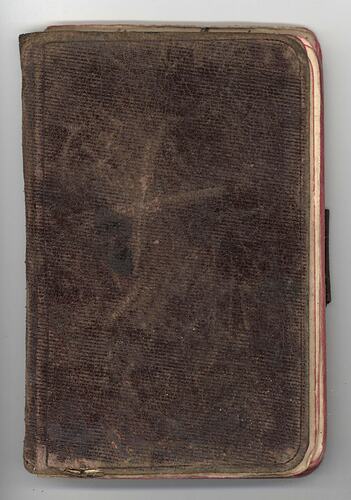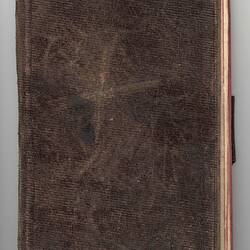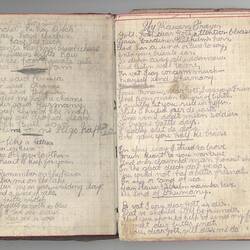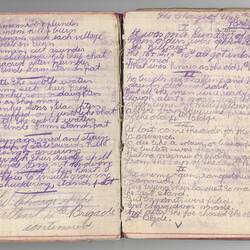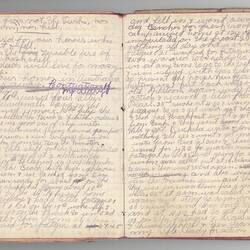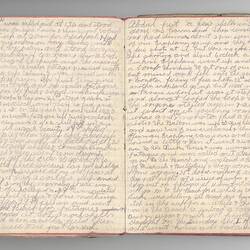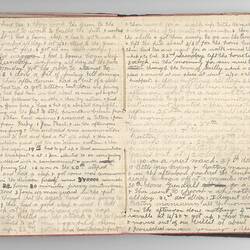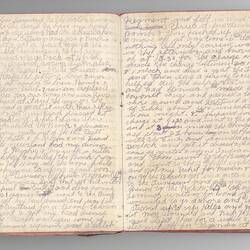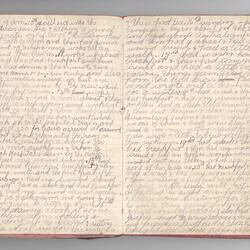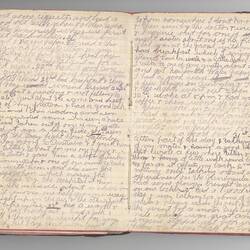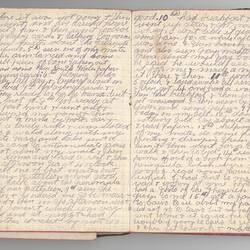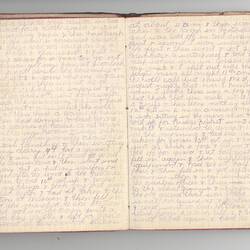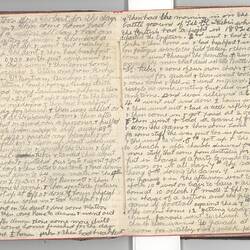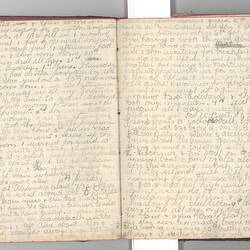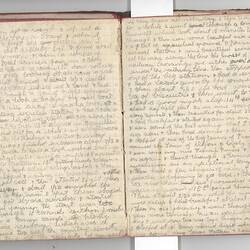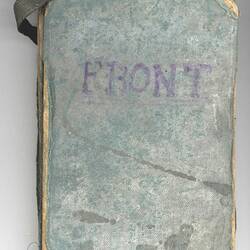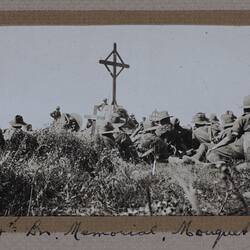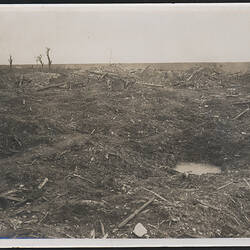Summary
Volume one of the World War I diary of Bombardier L.E. Clarke, 40th Battery, 4th Brigade, AIF. It commences on 11 July 1915 and closes 12 November 1916. The diary includes a collection of songs.
In July (diary scan page c) Langley writes:
'21st warned for fatigue and was warned to be ready to fall in at any time to go to the trenches & was issued with gas helmets to prevent the poisonous gas from hurting us & put back into our old Platoons again ready for action & received a letter from Peral. 22nd awoke at 4.30 & was on fatague [sic] w [?] go out to get water got the water & then had Breakfast went out got water from tanks & then went over the hill & got Buckshee water & done nothing until [?] 1.30 & went to get more water from two places & then waited for 4,30 for quarter masters fatigue. On 23rd at 3am was called out again and stood to arms for about 26 minutes and then back to bed. And at 4,30 had to get up to go on 6am fatigue & draw rations & miss breakfast & then cleaned my rifle ready for action...'
Langley Edward Clarke (regimental number 1015) was a 22-year-old labourer from Pontville, Tasmania, who enlisted on 21 September 1914. He was assigned to the 15th Infantry Battalion, 4th Infantry Brigade, G Company. He was sent to Broadmeadows for training, then embarked from Melbourne on the 'Ceramic' on 22 December 1914. He became a gunner and was wounded at Gallipoli. In March 1916, after his recovery, he was transferred to the 4th Australian Division Artillery and sent to fight in Fance, where he was promoted to bombadier. In January 1917 he was transferred to the 10th Field Artillery Brigade and subsequently was posted to the 38th Battalion. On 18 July 1917 he was severley gassed, and after treatment in England was shipped back to Australia unfit. He was discharged from the Army on 29 January 1918.
Physical Description
Hand-written volume of a diary, bound in dark brown leather, with rounded corners. Paper is off-white, ruled with vertial and horizontal lines. Diary written in combination of purple and lead pencil. (The purple pencil may be indelible pencil, which releases a purple dye when wetted). Small slot for pencil in back cover of diary.
Significance
Personal diaries provide a valuable insight into the daily life in the Australian armed forces. Some diarists record the mundane routines of daily life in military camps, or ports visited during voyages on transport ships; others provide graphic details of battles and medical treatments. Welcome letters and parcels from home are described, and friendships are recorded. Many soldiers complain about the food, or record welcome or festive meals such as Christmas. The diaries show many of the ways servicemen and women coped with the discipline, stress and tragedy of war.
More Information
-
Collection Names
-
Collecting Areas
-
Acquisition Information
Donation from Mr Hardy Enscoe, 04 Feb 1986
-
Author
-
Place Made
-
Place Made
-
Individuals Identified
CLARKE, L. E.(BOMDR.)
-
Format
Book
-
Inscriptions
[Extensive Text]
-
Classification
-
Category
-
Discipline
-
Type of item
-
Overall Dimensions
99 mm (Width), 15 mm (Depth), 143 mm (Height)
-
References
Service records for Langley Clarke are held at the National Archives of Australia - Series number B2455, Barcode 1969950.
-
Keywords
Diaries, Militaria: Australian, Military Memorabilia, Music, Wars & Conflicts, World War I, 1914-1918, Making History - War Diaries and Correspondence, Gas Warfare, Battle of the Somme (Somme Offensive), 1916
